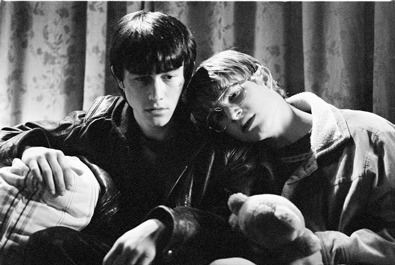Filmmaker Gregg Araki confronts pedophilia with unflinching candor
The opening scene of “Mysterious Skin” shows a young boy basking in a slow-motion shower of candy-hued Fruit Loops. But, believe me, the sugarcoating ends there.
For Gregg Araki has crafted a raw, exquisitely disturbing portrait of two small-town Kansas boys, forever poisoned by a pederast, that’s guaranteed to leave a bitter aftertaste. In fact, the film is so intense it’s rated NC-17.
Based on the 1995 novel by Scott Heim, the stylish indie is fresh from the 2005 TriBeCa Film Festival, where it caused a minor sensation. Araki’s boldly sophisticated take on such dicey material is a triumph—light-years ahead of most queer films that merely aim to entertain, and often miss.
Spanning roughly a decade, “Mysterious Skin” alternates between the lives of Neil (Joseph Gordon-Levitt) and his teammate Brian (Brady Corbet), who has blocked out the ordeal. The film is narrated by the boys as teenagers, each straining to piece together fragments of a woeful childhood. Understandably, these young victims have forgotten their connection to each other.
The story begins in 1981, when eight-year-old Neil is Coach Heider’s star Little League player. A half-hour into the film, we realize the Fruit-Loops flurry is actually a sinister trick the coach uses to sexually seduce the boy. Looking back, Neil describes the aftermath of the initial encounter as “a kaleidoscope that shattered.”
Heider continues the abuse for an entire summer, luring Neil with an “awesome” TV, Atari games, peach knee-highs and Kellogg’s cereal trinkets. “All that mattered was I made Coach proud,” the boy explains.
After his molestation, bespectacled, gap-toothed Brian suffers from nosebleeds and wets the bed. As a young adult, he seeks clues to his despair from a girl who claims she was abducted by aliens. He also scrawls in a “dream journal” to help dislodge buried memories.
As a teenager, Neil has hardened into a hustler, turning $50 tricks at a local playground, yet plenty of boyish charm remains. He delights in showing Wendy his number scribbled on a bathroom wall, like a baseball trophy. After he turns down a hopeful john, he says with a smirk, “I hate it when they look like Tarzan and sound like Jane.” It’s this razor-sharp dialogue that keeps “Mysterious Skin” from being a complete downer.
Neil wryly observes that his mother’s boyfriends all look like the Marlboro man, who would later be “his type.” It’s no coincidence that Coach sported a mustache, too.
With “Mysterious Skin,” the gay director, who gained a cult-like following with edgy films like “The Living End” and “Totally F***ed up,” has truly come of age. No other film has dared tackle this taboo subject with such uncompromising courage—and sensitivity.
Instead of taking the well-worn, gritty pseudo-documentary route, Araki favors a dreamlike, shimmering approach that serves to heighten the drama’s dark power. The gorgeous cinematography is courtesy of Steve Gainer.
Araki has a knack for extracting superb performances from key players. You may recognize Gordon-Levitt, who lends Neil a noble tawdriness, from his role on NBC’s “Third Rock from the Sun.” And Corbet (“Thirteen”) retains his boyish vulnerability as a young adult breaking free from his past. A brilliant scene where Brian confronts his absentee, oblivious father packs a wallop, steering clear of maudlin territory.
Both child actors (Chase Ellison as Neil, George Webster as Brian) also shine. The image of cute little Brian in his devil’s Halloween costume, magic-markered goatee and oversized wire-rim glasses is one that will long stay with you, especially after blood starts gushing from one of his nostrils.
Bill Sage, as Coach Heider, delivers a nuanced performance that humanizes the monster-pedophile image.
Unfortunately, Araki has neglected the supporting cast. Elisabeth Shue annoys as the freewheeling, slutty mom who loves her son but loves men even more. Apparently the director forgot to tell Shue, and her make-up artist, that the film spans ten years and to adjust accordingly. Lisa Long, as Brian’s doting mother, shares a similar problem.
Neil’s platonic soulmate, Wendy (Michelle Trachtenberg), despite her Goth outfits and sweet smile, is a one-note character as well. We grow as aggravated by her constant carping to “be careful” and “play safe” as Neil does. To her credit, as much as Wendy loves her young hustler friend, she knows the score: “Where normal people have a heart, Neil has a bottomless black hole.”
As has been done with other films set in the 1980s, you might expect a nostalgia soundtrack crammed with tunes from Simple Minds and Morrissey. But Araki goes one better. He’s secured two legends—ambient music master Harold Budd and Robin Guthrie of the Cocteau Twins—to create an entirely original score that smartly captures the film’s noir, ethereal aspects, while not entirely turning its back on the New-Wave sounds of the period.
Often gimmicks in the hands of lesser talents, Araki’s elegant directorial flourishes—fades to black, flashbacks, montages, characters speaking directly to camera—energize the film.
And don’t be put off by the mumbo-jumbo about aliens and the cosmos. It all works.
gaycitynews.com


































